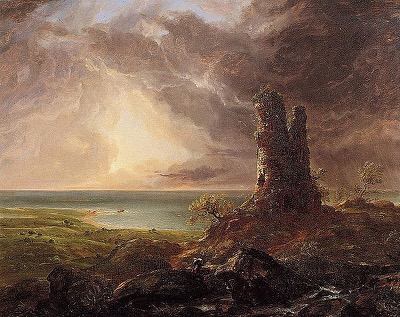RoughingIt

Thomas Cole: Romantic Landscape with Ruined Tower (1832–36)
" … what we call suffering, they would have experienced as pure luxury."
My Five Times Great Grandfather and his new bride headed West in an oxcart for what was then the Iowa Territory from what is now Southeast Ohio, circa 1810. He lost his bride when she fell off a ferry crossing an ice-choked Mississippi River. He arrived alone in his adopted home. I can't compare our situations. We've just lost use of the kitchen for a few days, but I admit to deeply feeling the inconvenience. I just finished clearing a path through about a foot of powdery snow to access the grill, where I set a pot of water on to boil for The Muse's morning coffee. Last night, I heated a pot of beans on that grill while swirling snow speckled my hair. I figure it's an adventure not requiring us to venture from home, though the box-cluttered interior seems almost entirely unlike home right now. We might have unconsciously set about undermining our sense of place when we conspired to change locations, the repainting just a part of a wiser puzzle. More indignities lie ahead, I'm sure, just as sure that I'll faunch at experiencing each and every one of them. I miss my space. ©2021 by David A. Schmaltz - all rights reserved
My boots seem too large for my feet, for I keep catching them on errant clutter whenever I attempt to navigate this newly-constricted space. Plastic film drapes from the kitchen ceiling and I washed last night's dishes while standing over the basement bathroom's sink. It seemed like we removed a significant portion of our possessions last week, ferrying them to temporary storage, yet the remaining rooms seem even smaller than before. Once the painting crew vacates, I'm confident that everything will find a fresh landing space. Until then, I'm thinking thin while feeling fatter. There's nothing the matter here that time won't heal.
When I try to imagine the patience my 5G Grandfather mustered, I figure that I must have inherited severely diluted DNA from what he carried. He quickly married a conveniently co-located frontier widow and commenced to producing babies. He made peace with the local original inhabitants, who were said to have declared him a "good" white man, a rarely-bestowed designation then. He lost his second wife to childbirth and married a third, producing offspring well into his sixties, even digging a deep new well when over seventy years old. His children spread to the winds, several west and some never wandering, and none ever experienced RoughingIt quite as rough as he had, not even his daughter, who lost her two oldest boys to Diphtheria while over-wintering in a tent after reaching what passed for her Promised Land near the end of the Oregon Trail. I suspect that RoughingIt works like DNA, diluting with subsequent generations until the later ones can't imagine surviving what their forebears took as base existence. I feel put-upon if I can't find clean underpants, for cripes sake.
Still, I sense a spattering of that old pioneer spirit as I improvise a method for brewing coffee without the usual conveniences. I think myself rather clever when I find a novel use for some implement that was clearly not designed to do that but still works, after a fashion. I put my head down and nudge my way through, feeling a little more human for the struggle which was frankly little struggle at all. Many this week lost their lights and heat when a storm traversed Texas and clearly demonstrated the dark side of fierce independence. On the frontier, a cardinal rule was 'never alienate your neighbors,' because one never knew who might come to their assistance when experiencing another extremis. Never if, but always when, because nobody ever managed to make it through without needing the help of even an unlikely friend. So far, so good only went so far before bad paid a visit and nobody ever slipped through Scot free. Neither do we, but what we call suffering, they would have experienced as pure luxury.


